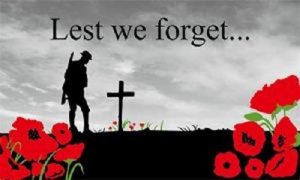This is my 65th year, getting on a bit, but I was still born 9 years after the end of the Second World War. Whilst our nation has been involved in many conflicts during my lifetime, none of them have had a major impact on life in this country – although some terror attacks did come quite close while we were living in London. My mother told me a little of her recollections of the blitz – of one occasion when a stick of bombs was falling, each one getting closer, knowing that the next one would get her – but fortunately there wasn’t another one! My father never spoke about the war, other than to say that he was in a ‘reserved occupation’ and didn’t have to serve in the forces. It was only at his funeral that my brother and I learnt that he had been employed during the war years as an auditor hunting for ‘economic saboteurs’ – an account I shall now never be told in full.
Many, over the years, have been reticent to recount their war experiences, though fortunately a few have left us their stories in print, and there are many images which allow us a fuller picture. Today, of course, we see all too much of what is happening in conflicts around the world virtually as it happens. Such reporting shows us first hand what we have always really known – that war is a terrible thing in which there are no real winners, and where the only certainty is that there will be terrible suffering. This suffering is inflicted by all sides whether deliberately or by accident – wars create casualties – and wars are created by humanity.
And where is God when there is war? Both sides will often claim that God is on their side. Over the centuries many have, and still do, wage war in “God’s name”. But in reality war is usually about human greed and human intolerance and has nothing to do with God at all. That doesn’t mean that God is not involved in war – for the God revealed by Jesus Christ cares about humanity in their suffering and was, and is, willing to share that suffering. The Christian God cares about each of us individually even if he may disapprove of what we do collectively.
So as we come to this year’s Remembrance Day – 100 years since the end of the “war to end all wars” – we do so not to honour war, but to honour those individuals who have suffered and died. We remember their sacrifice fighting for our nation and for the defence of the freedoms we enjoy. May we be worthy of them. May we share Christ’s care for all those left behind who suffer still. May we be willing to oppose the greed and intolerance which leads to war and commit ourselves to doing everything possible to prevent future conflict.
Isaiah prophesies concerning the end times:- “In the last days … He (God) will judge between the nations and will settle disputes for many peoples. They will beat their swords into ploughshares and their spears into pruning hooks. Nation will not take up sword against nation, nor will they train for war any more. Come … let us walk in the light of the Lord.” (Isaiah 2:2-5 abridged).
As we prepare to gather at the 11th hour of the 11th day of the 11th month so that “We will remember them”, may we desire, as they must have desired, that there would be no more war and look to the Lord to help us to make that possible.
Keith Browne